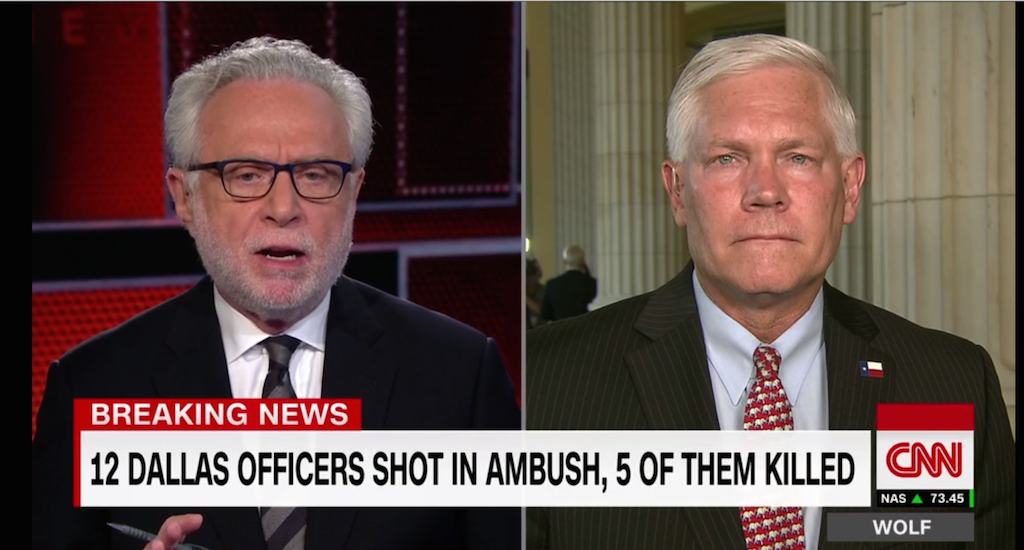Reports of shooters opening fire on innocent people are no longer rare in America’s newspapers. We’ve developed an argot for naming them and talking about them: a school shooting, the Orlando shooting, a church shooting, a police shooting. And while some news outlets have used the language of “shooting” to describe the awful killings in Dallas last night, others have opted for another term: ambush.
As in “5 OFFICERS KILLED, 7 INJURED IN DALLAS AMBUSH” or “AMBUSH IN DALLAS: 5 OFFICERS DIE IN SNIPER ATTACK AT PROTEST.”

An ambush is a surprise attack by some force lying in wait. Taken literally, it applies to what happened Thursday night, which saw a sniper perched above his victims, as much as it applies to the Charleston church shooting, where the gunman opened fire after participating in weekly bible study.
But there are other dimensions to the word ambush that feel dangerous when used here.
Ambushes are tactical operations. They are intentional acts performed by people or groups of people capable of behaving intentionally. Troops lure their enemies to the site of an ambush. Platoons ambush caravans on the right terrain.
When we say a gunman “ambushed” his victims, we assume a level of rational thought that we almost never ascribe to a “shooter.” There is a cycle in the media that happens after a shooter gets identified. First, we wait for a connection to terrorism, which is the search for a reason why. Did he visit the wrong websites? Message the wrong people?
Orlando shooting gunman pledged allegiance to ISIS. Here's the transcript of the 911 call. https://t.co/uaDaUsr2Bt pic.twitter.com/mtpfvTT8T5
— NYT Graphics (@nytgraphics) June 20, 2016
Then, we raid his Facebook. What did he post about? Who were his friends? There’s no piece of information too small because the collective desire to understand is so desperate.
Orlando shooting suspect pledged allegiance to ISIS on Facebook the morning of the attack https://t.co/rN3sBrqAa1 pic.twitter.com/NspKMyq3Rb
— ABC News (@ABC) June 15, 2016
Adam Lanza listed as having made honor roll in 9th Grade back in 2007, according to local report – http://t.co/NDgH6euO
— Matthew Keys (@MatthewKeysLive) December 14, 2012
Reports begin to surface about the mental health of the shooter. Did he have a history of depression? What about violence? Did his guidance counselor ever worry about him?
ABC News: Neighbors describe suspected CT school shooter Adam Lanza as "displaying characteristics associated with mental illness"
— Matthew Keys (@MatthewKeysLive) December 14, 2012
Orlando shooter’s ex-wife says he abused her, and he was emotionally unstable. https://t.co/n2OfEmREL0 pic.twitter.com/DjMdLSZ91L
— CNN Breaking News (@cnnbrk) June 13, 2016
That is not what’s happened so far today because we already understand how an ambush works. Someone has a mission and an elaborate plan to accomplish it. That the shooter told cops he “wanted to kill white people” is being reported as a confirmation of his intent, not the hateful ranting of someone we don’t yet understand.
More pernicious still is another aspect of the word ambush–the lure or the deception. Colloquially, when we speak of being ambushed, we talk of false pretenses, of a feeling of being tricked.
The police who were present last night in Dallas were undoubtedly there because of the protests, and the ideals of the protestors appear to have been perverted by the shooter into a sort of motivation. But those protests were peaceful and entirely separate from the shootings that followed. The police were not lured; they were not tricked. But when we call this attack an ambush, we begin to conflate the actions of the protestors with those of the killer. If not conflate, we at least begin to see them in concert.
In Orlando, we talked of victims and those who were lucky enough to escape. In Dallas, the group of people lucky enough to escape should include the protestors, who were present for a violent crime that could have easily claimed them as victims, too.
The reporting that gets done in the aftermath of a mass-shooting is a quick, messy affair. Facts change over the course of the day. Adam Lanza was at one point believed to the parent of a kid at Sandy Hook; he turned out to be the kid of a teacher. This morning we woke up to accounts of several shooters; now, police have killed the lone gunman. When the facts are wrong, we correct them. We should be equally willing to walk back the linguistic mistakes we make in the name of breaking news.
















